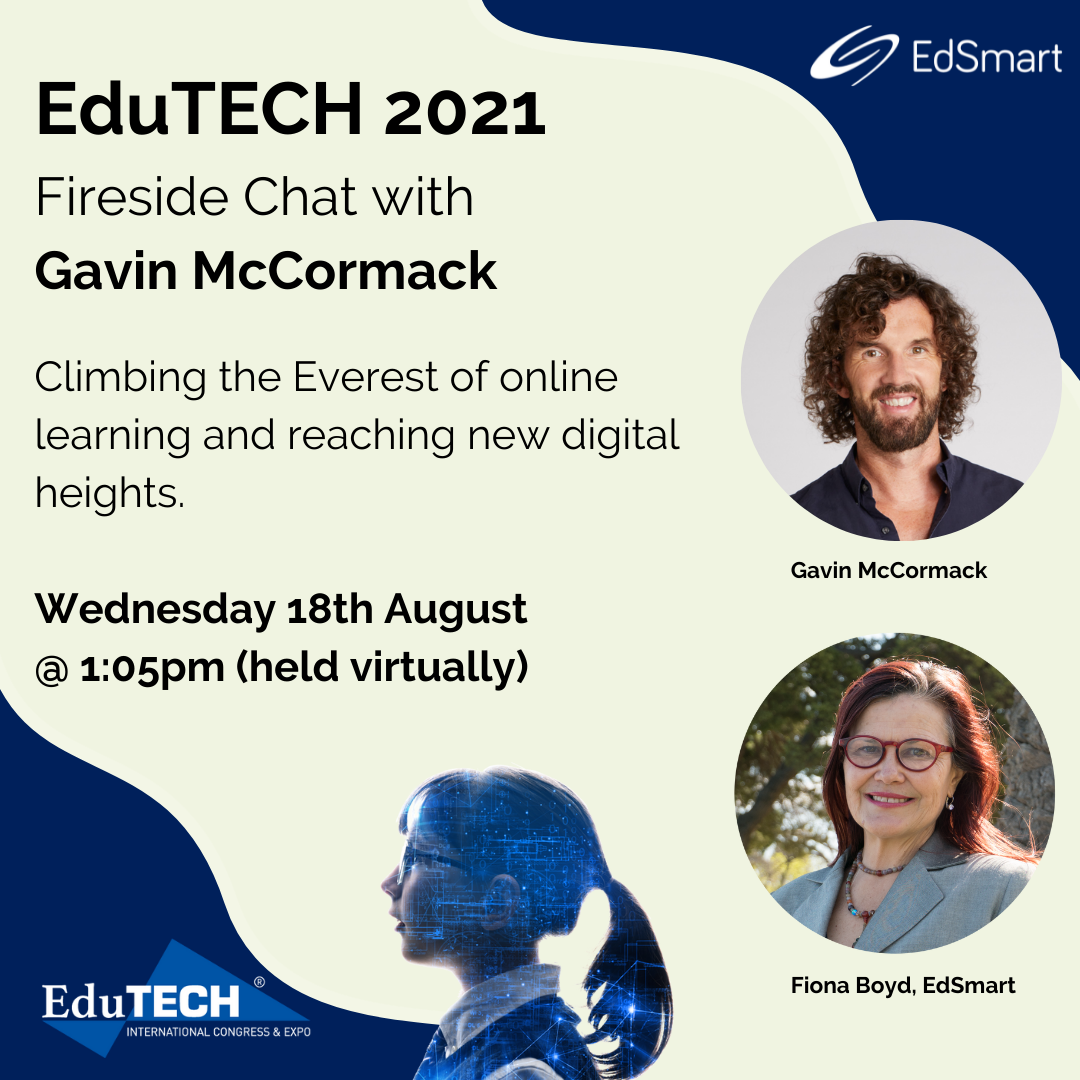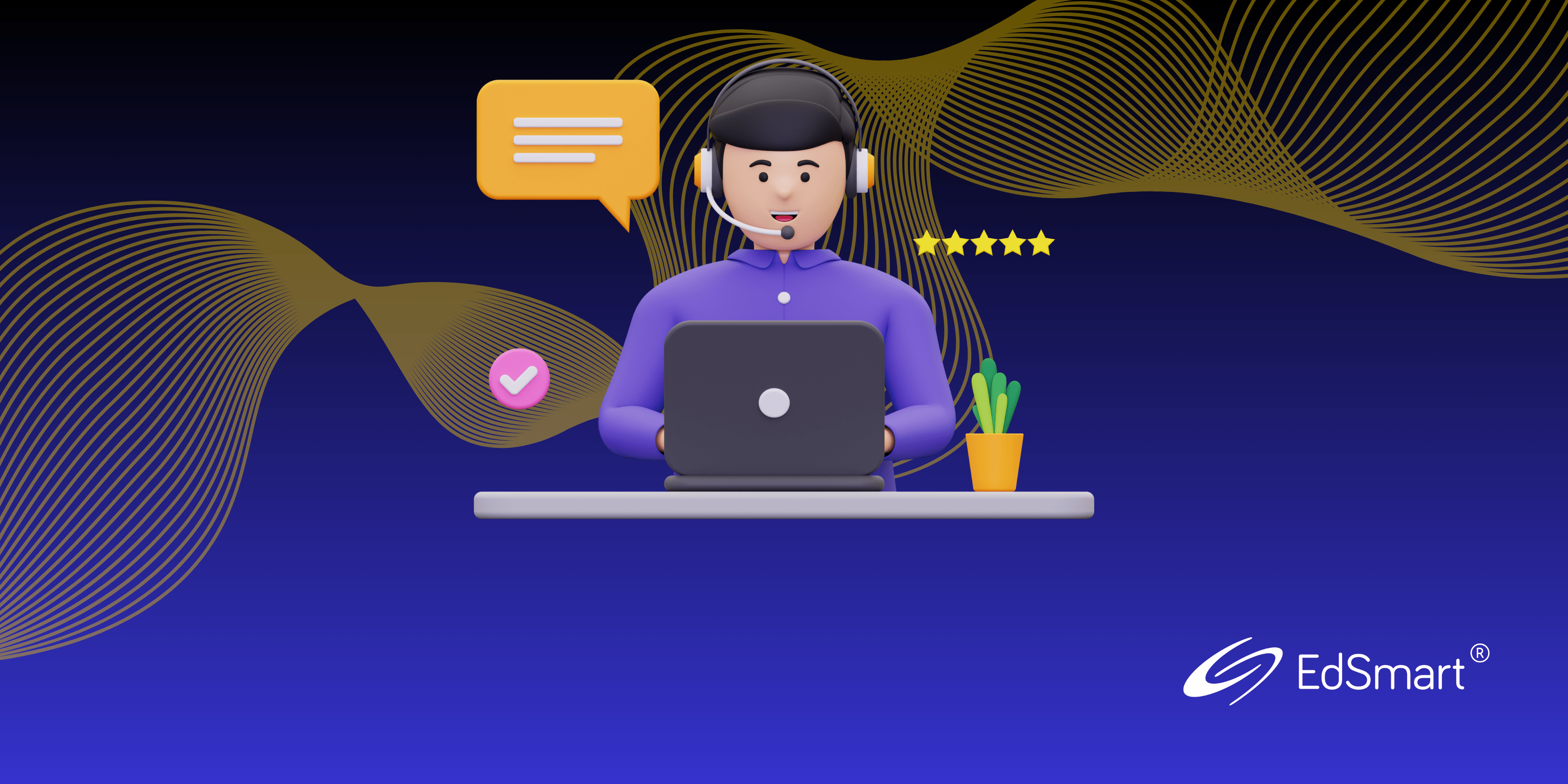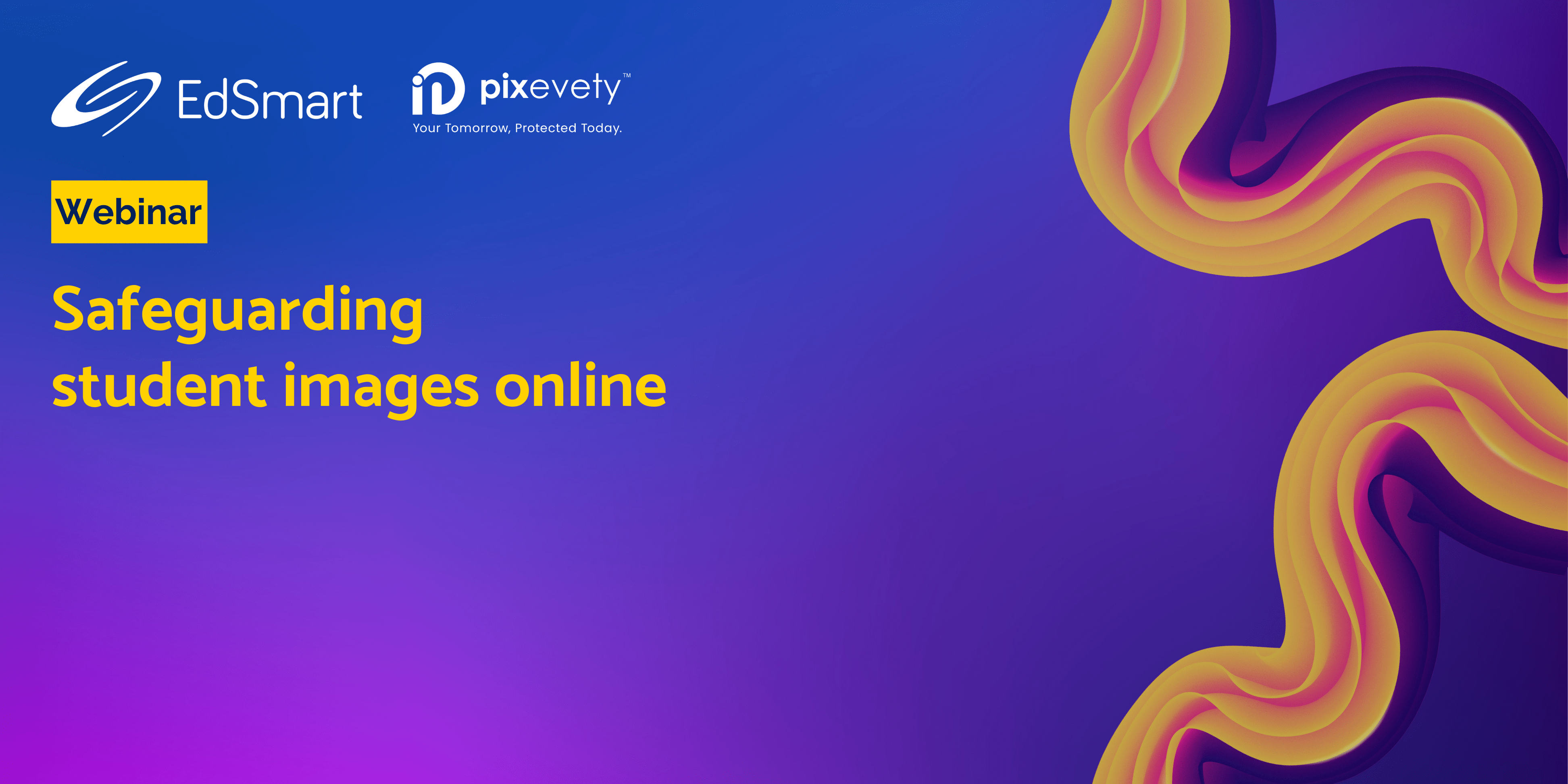EdSmart was privileged to interview star educator Gavin McCormack as part of EduTECH 2021 where we found out about his ambitions to reach new digital heights in online learning.
I love speaking to educators and innovators in the education sector and learning more about how they’re seeking to make the world a better place through the education of young people. This interview with Gavin McCormack – Montessori principal turned educational entrepreneur – was one of those occasions where my eyes were opened to huge possibilities through relatively simple processes.
This interview was recorded for EduTECH 2021 but I’m now pleased to share it with you.

VIDEO TRANSCRIPT
Fiona Boyd (EdSmart): Hello, I’m Fiona Boyd, co-founder of EdSmart, helping schools run better through digitising boring but important school administration. And I’m absolutely delighted today to welcome Gavin McCormack on this fireside chat. For the record though, full disclosure, along my own startup journey I’ve drawn inspiration over the past four years from Gavin’s LinkedIn posts which are incredibly honest, they share observations and insights and it’s so refreshing, honest content. So Gavin, just to let you know that it’s not just kids and teachers that you inspire, you inspire people like me running little EdTech companies as well, so thank you for that.
Fiona: Just a bit more about you, for anyone who doesn’t know which is probably not many people, but let’s bring them up to speed, you’re currently the principal and teacher at Farmhouse Montessori School in Sydney, though that is going to change. And today we’re going to explore some of the adventures with technology that you’ve had, of course, your 20 plus years of teaching and that you’re planning. So for everyone watching and listening, be prepared to be surprised and delighted. So welcome, Gavin.
Gavin McCormack (Education Influence): Hello. Welcome. It’s such an honour to be here, thanks for inviting me. I feel humbled, as it were, to listen to your words about inspiration on LinkedIn, thank you so much for saying that.
Fiona: We need people like you, they just keep the juice in the tank!
Fiona: Just to put it out there, your experience obviously doesn’t come from nowhere. Over 20 years you’ve been in the teaching–learning arena. You got qualified and then along the way moved into Montessori education, you’ve written books for children and you spend your holidays helping transform the education system in Nepal, good on you. Would you give us some of the detail around that history, I guess the short form version because we don’t have the afternoon, but could you give us a history as a teacher for those who don’t know you so well yet?
Gavin: Look, it started with a decision that I made to become a teacher in the first place. I studied economics, geography and whatnot at A-Levels in the UK and I had a long conversation with my mum about what to do in the future, where to go and what was going to be the right path to take. And on one cold and damp English night we were looking through the prospectus for university and she said, “Why don’t you just be a teacher? You’re so good with kids and you’ll never work for the man, you’ll always work for the good of humanity if you’re a teacher,” and so I decided that night to become a teacher. And I can’t lie to you, it was a bit nerve-wracking when I walked into my first job as a kindergarten teacher and I had 25 little kindie kids.
Gavin: And I remember feeling really nervous asking them to do a job for me like, “Okay, can you put the pencils away?” Because I wanted to do all those things myself, I didn’t realise that that collective responsibility is something that is just in every classroom in the world. So 25 years later, I’m now the principal of a Montessori school and that journey has been really interesting because as a mainstream teacher standing at the front of the class and teaching and being full of energy and full of beans and wanting to teach about volcanoes and history and science was great but then I realised about six or seven years ago that I was doing too much.
Gavin: I read a quote that said, good teachers know how to teach but really, really good teachers know when not to teach, and I’d been the opposite, I’d been the one who was at the front, the showman and doing all the razzle-dazzle and let’s get inspired. And then I thought to myself after reading that and I studied this Montessori education that, it’s really important to let go and say to the children, okay, I’ve inspired you, I hope, what would you like to do with what I’ve just said? And the children say, I’d like to build a model, I’d like to do a diagram, I’d like to write a play, I’d love to do a dance, I want to do a PowerPoint presentation with what you’ve just said on a completely different topic but use what you’ve just talked about as inspiration and then you let them go and off they go.
Gavin: When they go you have time to sit back and observe and see all of those skills that we want, all the skills we need so badly right now to right all the wrongs in the world, you see them all happening in front of you when you let go and when you say yes, and you can then observe them and assess them. And we often miss that point, we don’t give ourselves a chance as teachers to observe and therefore we miss those skills. We assessed them academically, we know they’re good at tests and you can do your mathematics and you can write a great essay, but do we see them collaborate? Do we see them empathise? Do we see them compromise? Do we see those skills which the leading industries in the world are all looking out for now, we often miss them and that’s where I am right now.
Gavin: I have a school where it’s part of our pedagogy, it’s part of our makeup, it’s part of a river that runs under our school, that’s part of who we are, we emphasise those skills. We don’t slack on the academics, of course, there has to be a hybrid. But I think that’s where I am right now and that’s why I’m here with you so yeah, I love that. And that’s what schools are crying out for, they’re saying, we want to be able to see these skills happening in our classrooms, how do we do that? And I’ve been doing that with schools for many years now, it’s been wonderful.
Fiona: So let’s talk a bit about technology because EduTech is all around education or technology in the education space. Where do you stand on technology? Because Montessori education it is really tactile, it’s very sensory, it’s touch, feel, immerse and do, but technology I think some people are feeling that it can make us less connected to each other, more connected at one level but less, obvious rule, touch, feel, do, kind of way. Where do you see technology as fitting into a school, into a classroom, into administration?
Gavin: Look, I think it’s very clear to get this point across that technology is amazing, there’s no question about that. I mean, what we’ve created as a human race, what we’ve established here is phenomenal. It used to be a matter of science fiction where you held a piece of plastic in front of your face and you could see somebody on the other side of the world, that was 1975 Star Trek movies and we thought, wow, imagine if that could happen? And suddenly it’s in front of us, you’re like, wow, actually you can do that. And children of today in our classrooms they have no idea that that didn’t exist before, they just think it’s just normal, oh, you just pick up the phone and you click this button and suddenly Barbara on the other side of the world is there.
Gavin: So it is amazing but it has to be used in a way that’s sustainable and in a way that’s not dominating in the curriculum. I mean, there’s always going to be a place for children sitting at a table and writing with a pencil and making a papier-mache volcano they’re going to erupt because you can never take that away because there’s so many skills that come with that. You grab the paint, I’ll get the paper, oh my goodness, we got the mix wrong, the volcano has fallen down, this is not working, all of that, you can’t let go of that, that’s very, very important. But technology gives us an advantage in terms of this connectivity and this open invitation to every single piece of knowledge is just there sitting with a click of a button, you can access anything you want.
Gavin: So the way that we run it in our school is we don’t turn away from technology in Montessori, what we do is, we have it in our rooms, we have it in our classrooms, but we use it in moderation. So we say to the children, okay, there is computers and iPads around the place and you can access them as you wish when you need it, however, there’s a limit as to how much time you can spend, which I think is important. So we say to the children, the computer, for example, is in the corner, has full internet access and all that jazz, you can use that but you only have a half an hour window and you have to book that, okay? You have to book that time. So what we see in our classrooms is phenomenal, really phenomenal, I’ve watched it with my own eyes and thought, wow.
Gavin: You see children coming into school who are six in the morning between 8:45 and 9:00, they have a bit of time to kind of get their day ready in Montessori, and organise their day. So you hear six year olds saying things like this, “Hey Tommy, do you want to do the project on dinosaurs at nine o’clock this morning?” And Tommy is saying, “No, I have a lesson at nine o’clock with my teacher, Toby, but I’m free at 10 o’clock.” And then the little girl says, “Okay, so 10 o’clock let’s meet at the computers so we can do our research, I’ll book it.” And she goes over into the little sheet and she books the computer for half an hour and what you see there is executive functioning from a six year old knowing full well that technology is going to bounce their research and help them in terms of their project but they know they only have a small window of time.
Gavin: And I think that’s amazing to have because we all need a limit onto how much time we spend on technology, there’s no question about that, but it does provide an amazing tool in terms of advancing what we can do on our connectivity. So I think Montessori has a reputation for being anti-tech or not having it in their classrooms or in their environment, however, if you go to Montessori schools all around the country or all around the world, they’re not avoiding it, they’re just using it in a way that’s managed carefully by the school.
Fiona: Have you used technology, let’s say, in your administration to help your school run better? Not the bits that come into the classroom but the bits that are unseen.
Gavin: Yeah. Are you talking about in the background, in the shadows, in terms of us running the school?
Fiona: Yeah.
Gavin: Yeah. I mean, look, of course we have everything digital so we have our whole school database digital, we have all of our paperless forms that go out to families, everything is sitting on the cloud, so reports go out on the cloud and all of that which I think is amazing. But that transformation is not easy, there’s a whole change management that comes along with that because some people have worked in our school for a very long time and these things aren’t easy to transform in terms of sending them out to the community because it’s something that not everyone has access to.
Gavin: I think the variables are out there in terms of what people have in terms of tech in their houses, some people still don’t have TVs, not because they can’t afford them, because they don’t think that they’re valid. So if they don’t have TVs then what’s the chance they’re going to have access to a G-Suite account? So there’s a lot of variables when you make that move but I think ultimately if you use it for the betterment of your school, the efficiency and the environment then it’s a no brainer to me to go towards that direction. So yes we have done that and it’s been fantastic, to be honest with you.
Fiona: You’ve become even more noticed recently, famous may I say, with the stories, so Storytelling with Gavin sessions that you’ve undertaken each evening in this particular lockdown, and it’s really lit a fire in community spirit. And look, I know ABC Radio doesn’t normally do story, you can’t make them do a story on you, they find their stories but you were on ABC Radio recently talking about Storytelling with Gavin. What interests me is that this simple thing has gone far and wide. What did that do? Did that surprise you?
Gavin: Look, it’s an interesting journey, I didn’t say this on the news the other night, but as a school, Montessori school, we were suddenly thrown into some spiral with COVID happening and suddenly the school was closed, kids were at home and all the teachers at school were going, “okay, how are we going to deliver this Montessori bespoke education to our students who are at home?” So it was kind of panic stations at first because it’s all hands-on, it’s all tactile learning and it’s all based around using materials. So for every single concept you have, you have a material that teaches that and to get that across was really hard. So luckily one of my parents, Nick, and he doesn’t mind me mentioning his name, he has a company called Digital Transformations, and you might want to look them up, but he came into school and said, “Gavin, let me help you out here because I’ve got an idea.”
Gavin: And he came in with a setup that had an overhead cam, a side cam, an iPad, and a little toggle button so I could just flick between overhead, front cam, side cam, iPad. And I looked at that, he showed it to me, I went away so excited, I said, I’ve got to have this, this is unbelievable, because it gives you an opportunity to be able to teach from all angles. You can demonstrate a material and the children could see it live at home, they can make it, they can use it. And the reason he came in was because he said, “Look, I’ve seen you teaching your story time at home and I saw a photo of you Gavin and you had your iPhone balanced on some books with a little torch shining on you in the corner of your apartment.”
Gavin: And I said, “Yeah, I’ve been doing that for months,” and he said, “Well, there’s another way,” and he brought this tech in and I thought, wow, if I had that in my house I’d be able to do wonders. But then what happened was this and I thought about that and I spoke to you and I spoke to some other people and the reason they love the Storytime with Gav at my house, was because it wasn’t so polished. It’s really good to have the teaching, I think, polished but this was about the fact that it wasn’t, you could hear me turning the pages, you could see my thumb holding the paper and the light shining on the book. And when you read a story to children in class or before, that’s what it’s like, you can smell the book, you can almost smell the book with Storytime with Gav.
Gavin: And it’s not massive, but I didn’t realise how big it was going to be and I was only going to do it for a small window of time, seven o’clock every night, do a little story and then go and have my dinner. But then a mum wrote to me from Pakistan, from Lahore, and she said, ‘I’m a kindergarten teacher in Pakistan, our schools have been closed for a long time, we’re recently opened, we don’t have any books, but every day at two o’clock, Pakistan time, the children come to my table and say, “Miss, Miss, it’s time for story time with Gav,”‘ and they all go and huddle around this little TV they’ve got and she connects it to her phone and she turns on story time with Gav, and she sent me a photo of these children on the other side of the world accessing a story and it was happening from my living room with the worst tech you’ve ever seen. And I thought, goodness me, I can’t stop now, I’ve got to keep going if that’s happening, and I’ve got more and more of this feedback.
Gavin: But I want to finish by saying this in terms of this question, when we use our influence for the greater good, when we get our intention and our purpose correct and we think about that carefully then there’s no question, you will have impact, you will have impact and people will come along that journey with you because it inspires them also to understand that they can make a difference too with the smallest thing. And I want to pass it on to my children at school to say, hey, no matter how small the thing you do is out there, no matter how small it is, if you can make somebody’s day, if it’s just one person, that’s enough. You can’t change the world on your own but you can change one person’s day, it’s very easy to do. So now I can’t stop and I will continue every night seven o’clock until I run out of juice or run out of books, I’m not sure which one will come first.
Fiona: So, Gavin, you surprised me when I called you to talk about this fireside chat by saying, “Well, I’ve handed in my notice and I’m about to do something next level with online learning,” are you able to let us in on the secret of that yet? Is that able to be public?
Gavin: Well, of course, it’s not so much a secret and it’s only in its infancy to be honest with you. I have handed in my notice at school and it’s not because of anything to do with the school, the school is beautiful. I’ve got a beautiful community, I’ve got a beautiful set of children, my staff are my friends and I love the school, there’s no question about that and I’m very proud of what we’ve created there. But yes, I have recently made a decision that in the new year next year I want to try to use what I’ve learned from Montessori, what I’ve learned from the digital transformation in terms of what was provided by Nick, in terms of the impact I can have with that. When I looked at what I was doing at school in terms of teaching photosynthesis to 25 children at home using materials, I thought to myself, imagine if there was 50,000 people on the other side of this screen, they would all get the same educational journey with this digital technology that I’ve got before me.
Gavin: So I have a good friend who is working down in Melbourne, down in south of Australia, his name is Richard Mills and he runs a company called Digital Schools. And he’s approached me saying, “Look Gavin, I see what you’re doing and next year, do you want to do something together? Do you want to help me on this journey of using technology to try to educate the masses?” And there’s a lot of things in the pipeline that might be coming through next year but the reason that I’ve left is because I wanted to have a bigger impact on the world for those people who can’t access school. I have friends in India, in Northern India, in Ladakh, where school has been closed for a year, a whole year, but those children have internet access 5G, faster than we have here in Australia, they have 5G internet access but they have no school.
Gavin: So if I can get the technology provided to me by Digital Transformations, put it in the corner of my living room and work with Richard Mills at Digital Schools and say, right, okay, I’ve got more time on my hands, let’s educate the masses from the corner of our apartment, then I want to do that. I want to do that because that will be amazing, that will be something groundbreaking, that will be something where the students in any school in the world will say, you know what? You can use technology for the greater good, you can make a big impact, look at this.
Gavin: It’s not just about selling products, it’s not just about gaining money or having larger commodities or all these material possessions, it’s not about that. Those things are fine but it’s not about that, it’s about going, okay, what can I do with this that’s going to change the world? And if it’s only educating one child in Northern India who joins every day, that’s enough, but it won’t be that because I’m not that kind of person who will let that happen, I’m the kind of person who will push it and drive it and hammer and I won’t stop until I’ve got a large amount of children who can’t go to school coming to my school.
Gavin: And I don’t know what it’s going to look like yet and I don’t know how it’s going to be and I don’t even know if it’s going to happen, but I’m going to really try and make something like that happen and I’m going to use the resources around me. And I’ve got to say, there’s a lot of people who want to help, there’s a lot of people who want to make that change and a lot of people who want to make a difference and I’m sure they’ll all come knocking on the door and say, hello yes, I want to help, I want to be involved, and I will say, yes please, that’s no problem. So yes, it’s very exciting times, it’s sad to leave my school because I love this school but I’ll still be around, I’ll still be there, I have a good relationship with my community so it’s going to be an interesting 2022.
Fiona: So Gavin, for anyone who wants to know the other projects and initiatives you’re running in the lead-up, there is a fabulous one coming up in September that will involve as many of the world’s teachers as who want to be involved, that one is about empathy, is that right?
Gavin: Yeah. Look, you asked me a question at the beginning about skills and education and the change between academics and essential skills, so I created, just as a whim last Saturday morning actually, I said, what if we got all the teachers in the world who are willing to give one hour of their time just for one week and they were going to put on their showpiece, their showcase lesson on Zoom, open access, and I just threw it online with a little poster I made in 10 minutes and two and a half thousand people in one day contacted me saying, yes please, I’m in. So then I made a Google Form, I put it online and we’ve got hundreds and hundreds of teachers lined up already and we still have six weeks to go. And the idea is in a nutshell, in one week between the 20th and the 24th of September we will have teachers all over the world, Canada, Bangladesh, India, Nepal, everywhere, teaching a lesson for one hour, their showpiece, their showcase lesson.
Gavin: We’ll have a timetable that will go up and any child in the world or teacher or parent can just drop in and out of any session whenever they wish. And it was all about teachers giving back to the community and showing that they want to help the world be educated. And we’ll see, it’s only a week in, maybe we’ll have 50,000 teachers by September, I have no idea but I think it’s something that is going to take off and we’ll do it every year I think. So yes, we’re calling it World Empathy Week. You can look it up on LinkedIn and you’ll find me there, if you want to volunteer I’ll be happy to receive your application.
Fiona: Oh, I can’t wait to join your online classroom with teachers from all over the world and I think everyone, not just students or other teachers will be interested. I think just more generally, how do people teach in other places certain subjects? I think that will be fascinating in itself.
Fiona: Gavin, thank you so much today. Just letting everybody know that if you head to the EdSmart booth, there is a link there that takes you through to Gavin’s books and you’re very generously going to sign every book that comes through that link so that if you’d like to know more or to understand the lovely children’s books and experience for yourself power of storytelling.
Gavin: Well, I’ve got one here right now. Yes, that’s right, thank you so much for plugging my book, I appreciate it. If you do buy any of my books, yes, I will sign them and post them anywhere in the world, so I have one on the shelf right behind me. So thank you so much Fiona, it’s so nice to be here, I really appreciate you inviting me.
Fiona: Wonderful. Thanks, Gavin, and see you sometime in the future.
Gavin: Okay. Bye. Thank you. everybody.
Fiona: Bye.
If you’d like information on how EdSmart can help your school to run more efficiently, CONTACT US to find our more



